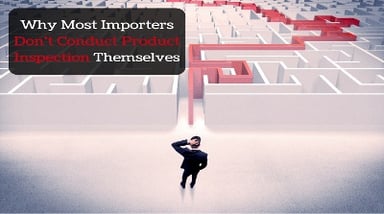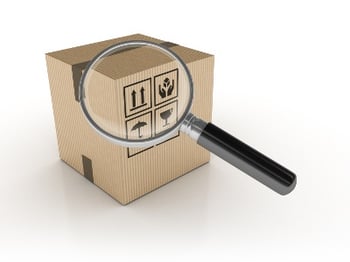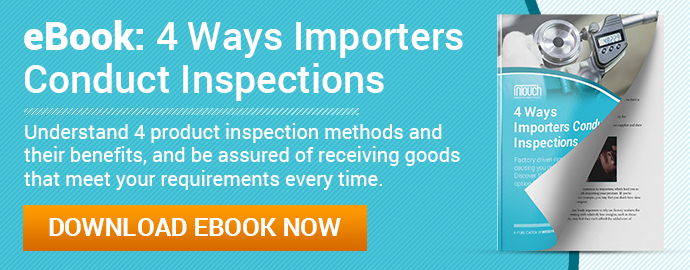 After much anticipation your first order of metal cutlery has finally arrived from your supplier. But you’re disappointed with what you find. The forks have four prongs, instead of three. Half of the spoons are bent or misshapen. And you’re left wondering why steps weren’t taken to manage quality better. Who conducted product inspection?
After much anticipation your first order of metal cutlery has finally arrived from your supplier. But you’re disappointed with what you find. The forks have four prongs, instead of three. Half of the spoons are bent or misshapen. And you’re left wondering why steps weren’t taken to manage quality better. Who conducted product inspection?There’s perhaps no better way to avoid receiving substandard goods than by inspecting them before they leave the factory. Inspection gives you the opportunity to find any problems and have them fixed before you receive the order. And there are a few different ways you can conduct inspection. One way is to personally travel to the factory manufacturing you product and inspect—or send someone from your company to do so.
Inspecting on your own this way can work well for some importers in certain circumstances. But most importers don’t conduct product inspection themselves. Let’s look into the main reasons why inspecting on your own may or may not be your best method of ensuring your product meets your standards.
Why some importers prefer to inspect on their own
There might be several reasons why you’d choose to take it upon yourself to inspect your own product, such as:- You feel since you’re an expert in your product, you’re the best person to inspect it;
- You think hiring a professional inspector to visit your supplier’s factory and inspect on your behalf will be too expensive; and
- You don’t know what other options you have for checking the goods before shipping
Inspecting the first order from a new supplier
Some importers find it beneficial to visit a factory to inspect the first order from a new supplier (related: How Often Should You Visit Your Suppliers?). This gives you the opportunity to meet with contacts at the factory and discuss any product concerns or requirements in person. Some importers, especially those with a lot of experience with their product, will find they can more easily suggest solutions to quality problems by seeing them firsthand in the factory.
concerns or requirements in person. Some importers, especially those with a lot of experience with their product, will find they can more easily suggest solutions to quality problems by seeing them firsthand in the factory.Training QC staff on special inspection procedures
Another valid reason for participating in product inspection yourself is to train inspection staff. Whether you’re relying on factory QC staff or hiring third-party or full-time inspectors, it can be helpful to observe the inspection process and provide feedback on-site. For example, you may want the inspector to use a testing procedure or standard other than the one they might typically use. And although not always necessary, it may help to explain the procedure to them directly.Why most importers choose to hire someone locally to perform inspection
You may be tempted to visit your supplier’s factory to inspect each order before it ships. But most importers don’t conduct product inspection themselves. Instead they often prefer to hire someone else to inspect locally on their behalf. In doing so, they typically benefit from three main advantages:Cost savings
Costs can add up quickly when traveling to a foreign country to visit a factory. Transportation, hotels, meals, gifts and translators are all potential expenses you’re likely to incur when traveling to inspect on your own. Inspections performed inefficiently can raise costs as well (related: 5 Reasons for High Product Inspection Costs).
Aside from financial costs, time spent traveling and checking the product is another factor to consider for inspection. For example, an importer traveling from New York to Shenzhen, China would likely board a 13 or 14-hour flight to Hong Kong. Then they’d need to cross the border to Shenzhen and arrange transportation to the factory (related: The Best Way to Shenzhen from Hong Kong Airport). Add in the time needed to inspect and return home and you’ll basically be occupied for a few days to a week minimum.
Hiring a professional inspector to visit the factory for you reduces these costs significantly because the inspector is typically locally-based or at least resides in the same country where the factory is located. You might spend one or two thousand dollars traveling to and returning from China. But you’d spend much less time and money by hiring someone in China to visit the factory and inspect your goods. You’d simply arrange the inspection and wait for their report.
Professional experience with product QC
Some importers think that being an expert in a product makes them the most qualified person to inspect that product. But unless they have a strong background in product quality control, it usually doesn’t make sense for importers to personally inspect their products every time.
Properly inspecting a product requires knowledge that someone only familiar with the product design or requirements may lack. For example, importers often don’t know how to effectively pull random samples or use an acceptable quality limit (AQL) that yields the most transparency. They may also be unfamiliar with the types of on-site testing recommended or required for their product.
But experienced product inspectors generally do have this and other relevant knowledge. And importers can often hire inspectors with experience in their specific product type, such as furniture, building materials or oil & gas equipment.
Improved communication with suppliers
The last issue with inspecting on your own is sometimes overlooked but quickly realized–communication challenges. Communication can be difficult even when you speak the same language as your supplier and their factory personnel (related: 3 Barriers to Communication with Suppliers). There are a few potential reasons for this:Sales staff often lack technical knowledge
You might find it difficult to communicate with a supplier if you’re talking to a salesperson with limited technical knowledge.
The salesperson is often responsible for relaying vital information to the production manager in the factory. Important product details, such as dimensions, tolerances, requirements for parts & materials and others could be lost in communication. The problem could be more complicated if your supplier is a vendor or trading company located in one country, while the factory actually making your product is in another.
By hiring someone locally to visit the factory for inspection, you can typically rely on that person to communicate issues with factory staff. They can help you clarify product requirements and other misunderstandings that often arise between importers and their overseas suppliers.
Misunderstandings caused by cultural differences
It may seem that cultural differences can only lead to harmless missteps in etiquette. But a lot of importers find cultural differences to be a real challenge to their success. 
In East Asia, one of the main issues you’re likely to encounter with suppliers is their reluctance to deliver bad news. Suppliers here often want to avoid confrontation or disappointing a customer. So instead of telling an importer directly that their order will be delayed, for example, they often wait until the importer discovers this on their own.
Another example of cultural differences that can lead to problems is the concept of saving “face”, which can make some people reluctant to admit when they don’t fully understand something. A fear of seeming incompetent can keep some suppliers from asking important questions or asking you to clarify aspects of your order. Hiring a local inspector to visit the factory can help limit this and other communication problems.
Conclusion
Every importer is different. What works well for one might not work for another. Across the variety of importers, some may feel personally inspecting is the best way to handle their product QC. And it can be, particularly when dealing with a new supplier.
But generally, importers don’t conduct product inspection themselves. They realize the value of hiring professionals to handle most of their inspections. Not only is it more convenient, but it usually saves time and money when compared to personally inspecting each order. It also takes away the hassle of travel and eliminates any chance you’ll miss any defects for lack of inspection experience.
Ultimately, the benefits of relying on a seasoned and professional QC team more than make up for the hiring costs.
What other benefits have you found with inspecting your own products? Let us know in the comments below!







